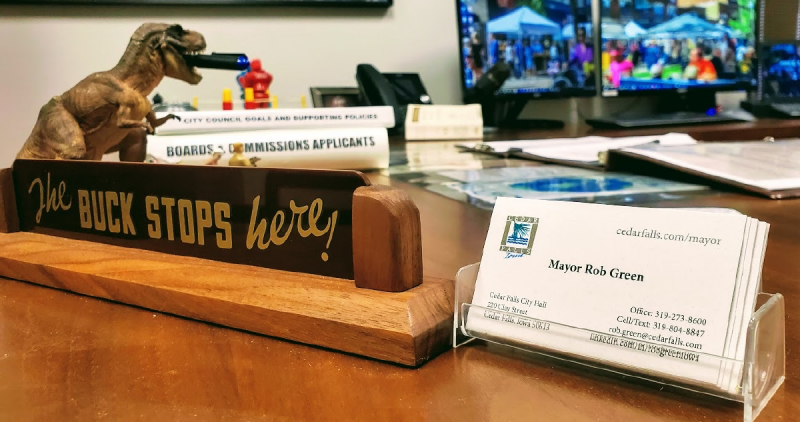
In this blogpost, I'll be referring to the Mayor - Administrator Proposed Ordinance Update (.pdf), which also appears in the Council Packet for Monday, 4/5/2021 as Item #34. I invite you to download this document and refer to it as you read the blogpost.
Here's What's Happening...
I'm advocating for updates to the City Code, as it relates to the Mayor's and Administrator's job descriptions (the doc in the link above). After some terrific discussions in open meetings with the City Council these past few months, the proposed revision will be considered by the City Council on Monday, April 5 in the first of three required readings, for adoption into the City Code of Ordinances.
Here's Why...
In my mayoral campaign platform, I pledged to “Seek clarity in the law”, under the vital civic premise that "Good Governance Follows the Rule of Law". If some part of the law (including City Code) is obsolete or impractical, we can’t just ignore the law -- we have to do the work to rectify it. Otherwise, what’s the point of the law?
In three years of studying the office and practice of Mayor in Cedar Falls and elsewhere, I found a number of Mayor-related items in the City Code that were unclear or outdated. In some cases, the language hadn’t changed since the 1920’s, even though the mayor role -- and the city itself -- had significantly expanded. I’m not one to kick the can down the road, so during the last several months, I’ve drafted changes for the City Council to consider, to ensure that the actual job description of the mayor is a better reflection of how the Mayor role actually functions in Cedar Falls. And the City Council has been exceptionally helpful and engaged in making sure the language captures their intent for the Mayor role (thank you!).
To be crystal clear - the proposed ordinance updates do not cede one ounce of mayor authority to either the city administrator or to the city council. This is made clear in Sec. 2-187(a): "The mayor shall retain and exercise all authority over the conduct of the city government”. The Administrator understands and appreciates this fact, the Council (as a whole) understands it, and hopefully the people of Cedar Falls understand it, too. The mayor is the people's elected "captain of the ship" of government and is ultimately responsible for the manner in which local government is executed. Plain and simple. Authority can be delegated, but the accountability is always, always, always, with the mayor.
Here's How...
The document (which hopefully you downloaded and are looking at) has some black text (meaning it wasn't changed), some red underlined text (meaning it was added), and some red 'strikethrough' text (meaning it was deleted). In some cases, items have simply been relocated (like the power to suppress disorders in an emergency, 2-187(a) has been moved to a more logical place elsewhere (Sec. 2-188 - Emergencies). Other specific changes worth highlighting are:
Agenda Approvals: The updated ordinance specifically notes that the Mayor is responsible for approving the council agenda, and that a majority of council members can overrule this decision and require an item to appear. This had not been clearly spelled out in the code, and is an important power of the mayor for setting the agenda of City Council meetings.
Budget Preparation: The ordinances currently state that the mayor ‘prepares and submits’ the annual budget. The ordinances also state that the administrator ‘prepares and submits’ the annual budget. For clarity’s sake, the revised ordinance specifies that the administrator prepares the budget, and the mayor submits it. Inherent in that “submit” is the ability of the mayor to review the budget and direct changes to be made to the budget prior to submitting it to the Council for approval.
Arresting Powers: The existing city code states that the Mayor can arrest people. Do the people of Cedar Falls want a mayor with no law enforcement training or experience to directly arrest citizens, handcuffs and all? What if the person resists arrest? Should the mayor also have a taser and a gun to compel compliance? This ‘arresting powers’ language dates back to at least 1927, and in the last hundred years, the law enforcement profession has advanced to require significant training and credentials to properly arrest someone and have that arrest hold up in court. I happen to have had that training & experience, so I know how much is involved. I wouldn't want a mayor thinking he or she can just go out and do it. While the likelihood of a “mayor arrest” is small, it’s an arcane relic of the past, a real liability, and should be removed from the code entirely.
Emergency Powers: The City Code currently doesn’t list the mayor’s emergency powers in the Mayor ordinance, but this is a vital component to the mayor’s duties. I want to make sure the powers are readily apparent and clear to whoever takes this office after me. Interestingly it includes that the mayor can
“take command of the police and govern the city by proclamation, upon making a determination that a time of emergency or public danger exists. Within the city limits, the mayor has all the powers conferred upon the sheriff to suppress disorders”. (per Iowa Code 372.14(2)).
Again, I don't believe this means the Mayor is directly arresting people. I'd be directing city law enforcement to do that. But it's a lot of additional power nonetheless.
Elections: The City Code currently has two paragraphs about the Mayor’s duties in an election. These instructions are no longer valid (the county Auditor’s Office is now responsible). So this whole section should be removed as obsolete and unfollowable.
Administrator Evaluation: One of the primary supervisory tools held by the Mayor is the annual evaluation of the City Administrator. This vital practice ensures that all parties continually understand that the Administrator works directly for the Mayor, following the guidance provided by the Mayor and City Council. In the past it has not been customary for the Mayor to carry out this vital task (which is required by the City Code). The update makes it clear that this must be done, and I'm also working to put the evaluation process into a city policy for continuity down the road. It's that important.
Making Reports to Council: The current Section 2-218 (22) states that the city administrator shall "Make such other reports as the city council may require concerning operations". A concern was brought up that "concerning operations" is deleted in the proposed revision. As if that meant that the council can no longer require reports on operations. Completely the contrary -- that phrase was removed to clarify that the Council can require reports on ANYTHING -- that the reports are no longer limited to ONLY operations.
Here's What's Next...
The Council has reviewed the proposed ordinance revisions in conceptual terms, then in more concrete form over the last several weeks. In the Monday, April 5th regular council meeting, the document will be up for discussion, amendment, and first approval. If it passes, then it will be up again in the April 19th meeting, and if it passes, the final reading will be on May 5th. The public is invited to comment and ask questions at each of these readings. After final passage, you won't notice any changes in how the government is being carried out here in City Hall...again, these changes are to reflect how we already actually operate (for instance, I'm not going to "stop" arresting people, since I already don't do it).
Here's What to Look for...
Conspiracy theories are starting to abound that this is a power grab by the Administrator, or that the changes make the mayor just a figurehead. Not true. Those pushing these stories are either reinforcing the narrative of their existing prejudices or are playing on emotions and fears for political points in an election year (or both). I've laid out the case above in order to explain what these updates really are, and encourage you to carefully scrutinize the document for yourself. If you believe the changes give away any mayoral power or accountability, let's talk. This is a great exercise in civics, and in understanding what the role of a mayor is (and should be) in a city government. I enjoy the conversations, and always learn from them.
Thanks as always for reading to the end, and for doing the necessary and thankless work of being an informed and engaged citizen. Civics is a team effort, and I'm truly grateful you're doing your part.
